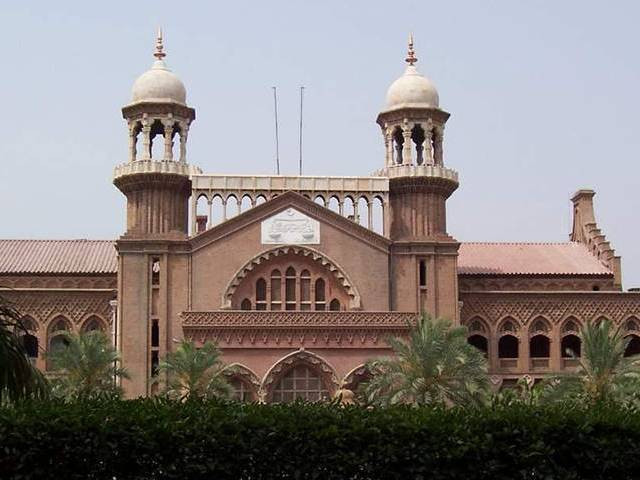Section disqualifying Imran challenged in LHC
Counsel says ECP violated Constitution as it is neither a court nor tribunal to have capability on interpreting law

A petition was filed on Monday in the Lahore High Court (LHC) challenging the Election Commission of Pakistan’s (ECP) relevant section under which Pakistan Tehreek-e-Insaf (PTI) Chairman Imran Khan was disqualified.
LHC Justice Sajid Mehmood Sethi issued notices to concerned quarters seeking legal assistance from Advocate General Punjab (AGP) Ahmed Awais on the plea.
The petitioner’s counsel senior advocate Azhar Siddique implored the court that section 137(4) of the Election Act, 2017 be declared ultra-vires the Constitution of the Islamic Republic of Pakistan, 1973 with further contention that the concerned authorities, especially the ECP, be restrained from taking any action or proceedings in this matter as the electoral watchdog is not a court of law, adding that it has no jurisdiction to do so.
Siqqique informed the court that Article 63(1)(p) of the Constitution states that an individual is, “for the time being, disqualified from being elected or chosen as a member of the Majlis-e-Shoora (parliament) or of a provincial assembly under any law for the time being in force”.
Read: 'Shameful': PTI reacts to Imran's disqualification in Toshakhana reference
He furthered that this provision does not apply to the former prime minister’s case as there is no mention of “disqualification” in the sections mentioned in the ECP order – such as sections 137, 167, and 173 of the Act.
The counsel added that Article 63(1) (p) permits punishment mentioned in any law for the time being in force.
“Likewise, not sharing details of Toshakhana gifts and proceeds from sale does not lead to disqualification. It can occur only when prosecution is commenced within 120 days of filing under Articles 63(2) and (3) of the Constitution,” Siddique told the court.
The counsel added that the electoral watchdog has violated the Constitution as it is neither a court nor tribunal to have the capability of interpreting the law, adding that the ECP has adopted incorrect interpretation, and has gone beyond its mandate and the mandate of law.
“It is worthwhile to mention herein that various judgments have been passed by the Courts of Pakistan with regards to the fact that ECP is not a court of Law,” Siddique implored the court.
He furthered that the ECP could have promulgated its own independent Act, however, the same cannot encroach upon the jurisdiction of the High Court and the Supreme Court of Pakistan (SCP).
Also read: Toshakhana reference 'misleading, baseless', Imran tells ECP
Siddique stated that under the law, Imran is a member of the National Assembly of Pakistan after winning six out of eight seats in the recently held by-polls of the NA, and he can take oath of his office, at any time, whilst ECP has no authority to restrain him from doing so.
The counsel referred to a recent observation by Chief Justice of Pakistan (CJP) Umar Ata Bandial, wherein the top judge said handing down disqualification to a lawmaker for life under Article 62(1)(f) of the Constitution could only be done through a declaration by a court of law.
Siddique termed the ECP verdict “hollow” and stated, “It is also pertinent to mention herein that it is nonetheless a hollow verdict, it would have been rendered meaningless under Article 63(1)(g) of the Constitution, as ECP is not a court of law”.
All the instances which have been provided in Section 167 of the Act are clearly in a pre-poll context, hence, there is no corrupt practice on part of Imran Khan, whatsoever, the counsel told the court.
Read: IHC bars ECP from holding by-polls in Imran's Mianwali seat
He concluded that the ECP has deliberately erred in law and has utterly failed to comprehend its own governing law. Furthermore, when the limitation according to Section 137 of the Act is over (120 days), then, how is it possible that an order under Section 167 of the Act is being passed. Section 137 of the Act, is, therefore, ultra-vires the Constitution, especially, Articles 218 and 222.
ECP’s verdict
The ECP on October 21 disqualified PTI chairman and deposed premier Imran Khan under Article 63(1)(p) as it announced its verdict in the Toshakhana (gift depository) reference.
The electoral watchdog’s verdict sparked protests in various cities.
A four-member bench of the ECP declared Imran's National Assembly seat vacant as it unanimously decided that he had misled officials about the gifts he received from foreign dignitaries during his tenure as the prime minister.



















COMMENTS
Comments are moderated and generally will be posted if they are on-topic and not abusive.
For more information, please see our Comments FAQ